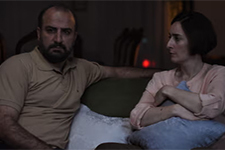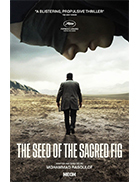The Seed of the Sacred Fig (Dâne-ye anjîr-e ma’âbed)
|  Mohammad Rasoulof’s tenth film, The Seed of the Sacred Fig (Dâne-ye anjîr-e ma’âbed), is a blistering drama about a family torn apart by the institutional and political pressures of the Iranian regime. Shot largely in secret due to the critical nature of the subject matter and edited in Germany after the footage was smuggled out of Iran, the film is based in the widely mediated 2022 protests after a young Kurdish-Iranian woman named Mahsa Amini died, most likely at the hands of police who had arrested her not wearing a hijab. Rasoulof, who both wrote and directed, cannily incorporates the real-life event as the backbone of his fictional narrative, using it as a dramatic basis for much of the tension both inside and outside his characters’ household. He and editor Andrew Bird weave actual video footage of street protests and police brutality throughout the film, sometimes as watched on social media by the characters, thus adding evidence of the hard, raw realities evoked by the film’s symbolic title, which refers to a specific kind of fig tree that grows on and eventually strangles a host tree. The film’s inciting incident would, in another context, be something positive: a job promotion. In this case, Iman (Missagh Zareh), a lawyer who works in the Islamic government, is promoted to a chief investigator for the Islamic Revolutionary Court, which is an important step toward becoming a judge. This is a major career advancement for him, and it comes with a salary increase and his family being able to move into a larger apartment where his daughters, college-age Rezvan (Mahsa Rostami) and high-school-age Sana (Setareh Maleki), can have their own rooms. His wife, Najmeh (Soheila Golestani), who is steady and practical, recognizes that Iman’s promotion means that their family will be scrutinized in every way, which is why she is uncomfortable with Rezvan’s friend, Sadaf (Niousha Akhshi), who is going to live in a college dorm and appears to hold liberal, activist views. Najmeh is stern with her daughters and what she expects of them, but she clearly has a tender side, as well, which we particularly see in her treatment of Iman, who is now frequently absent and stressed due to his job responsibilities. We see him at work with a fellow investigator, Ghaderi (Reza Akhlaghirad), who is more seasoned and recognizes even more than Iman does the political peril in which they constantly live. He is also the one who informs Iman that he was promoted not because of his expertise or accomplishments, but because the government sees him as someone they can use to rubber stamp their indictments, a prospect that troubles Iman. Although he will eventually become monstrous in his desperate attempt to hold together his position and his family, Iman is a fundamentally moral, upright man who genuinely believes in what he is doing. That, of course, makes him all the more dangerous because, unlike the rest of his family, he never questions his actions, believing that they are the will of God. The peril faced by Iman’s family stems from both the Islamic government itself, which allows for no deviation from its strict religious laws, but also from the general population, many of whom chafe under the pressures of the government’s laws and might seek to hurt its representatives or their families. That is why Iman is issued a handgun, which becomes both an emblem of his new power and a source of immense turmoil when it mysteriously disappears. The search for the missing gun moves the plot into its harrowing third act, which finds Iman acting as chief investigator of his own family, treating his wife and daughters like political prisoners who must be interrogated in order to reveal “the truth,” whatever that needs to be. At this point the film shifts from the urban streets and apartments of Tehran to the rural, sparsely populated desert, with a climactic game of cat and mouse unfolding in and around a crumbling ancient village that at times threatens to turn the lengthy film into a more conventional horror-drama. Rasoulof and his cast and crew put themselves in immense danger to make this film in Iran, which one can see as either incredibly brave or deeply foolish. Rasoulof, whose previous films have put him on the wrong side of the Iranian government, was sentenced to eight years in prison and flogging just after The Seed of the Sacred Fig was accepted at the 2024 Cannes Film Festival (where it won a Special Jury Award), and he ended up fleeing the country, as did several other members of the cast and crew. Actors Soheila Golestani and Missagh Zareh were not so lucky, and they remain in Iran, where their powerful performances as Najmeh and Iman are unlikely to be seen. Much of the rest of the world, however, can appreciate their deep and convincing portrayals of people who are crushed under an unrelenting regime that forces one to abandon her beliefs and the other to dig in so deep that he can only emerge as something inhuman. For Rasoulof, that is the fundamental tragedy of his country and what it has become. Copyright © 2025 James Kendrick Thoughts? E-mail James Kendrick All images copyright © Neon |
Overall Rating: 


 (3.5)
(3.5)


